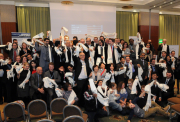Transport Day 2013, which took place alongside the Warsaw Climate Change Conference, was supported by the Bridging the Gap initiative (BtG) and the Joint Convener Partnership on Sustainable, Low Carbon Transport (SLoCaT), with a focus on rethinking transport and climate change.
 17 November 2013: Transport Day 2013, which took place alongside the Warsaw Climate Change Conference, was supported by the Bridging the Gap initiative (BtG) and the Joint Convener Partnership on Sustainable, Low Carbon Transport (SLoCaT), with a focus on rethinking transport and climate change.
17 November 2013: Transport Day 2013, which took place alongside the Warsaw Climate Change Conference, was supported by the Bridging the Gap initiative (BtG) and the Joint Convener Partnership on Sustainable, Low Carbon Transport (SLoCaT), with a focus on rethinking transport and climate change.
The full-day event began with a panel discussion on sustainable transport as a key building block of sustainable low-carbon development. The plenary panel was composed of representatives from, inter alia, the: Indonesia Transportation Society; African Development Bank, Women’s Environment & Development Organization, International Union of Railways; EMBARQ; and German Federal Ministry for the Environment, Nature, Conservation and Nuclear Safety.
Participants then broke into smaller groups to consider: mitigation potential of the transport sector; policy making on sustainable, low carbon transport in the developing world; ensuring effective nationally appropriate mitigation actions (NAMAs) for transport; integrating adaptation into transport policies; and sustainable, low-carbon transport financing. The discussion groups were followed by a panel discussion on developing a message to the UNFCCC negotiators on sustainable, low-carbon transport. The closing panel session was composed of representatives from Youngo, UN-HABITAT, Institute for Transportation & Development, World Bank, and Warsaw Trams.
The session concluded with the adoption of the Warsaw Statement on Low Carbon Transport and Sustainable Development. The Statement, inter alia, calls on parties at the Warsaw Climate Change Conference to ensure near-term progress on: strengthening developed countries’ pre-2020 GHG mitigation commitments for the land transport sector; encouraging and supporting developing country efforts aligned with sustainable development strategies and plans; exploring ways to strengthen financial incentives to reduce black carbon and address adaptation needs; support complementary measures being taken in other multilateral fora for reducing emissions, especially to remove fossil fuel subsidies, improve vehicle efficiency, phase out HFCs, reduce emissions from international aviation and shipping, and develop post-2015 development goals supporting sustainable low carbon transport strategies; and provide long-term funding for the technology mechanism and the Climate Technology Centre and Network (CTCN) and agree to a process that would deliver a global Technology Action Plan in 2015 for land transport. [IISD RS coverage of Transport Day 2013][Transport Day 2013 website]